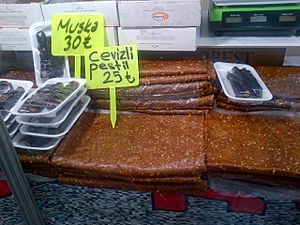Pestil facts for kids
 |
|
| Place of origin | Ottoman Empire (?) |
|---|---|
| Main ingredients | Grape must, nuts, flour |
Pestil is a tasty snack from Turkey. It's also known as "fruit leather" in English. The word "pestil" means "dried fruit pulp" in Turkish.
To make it, fruits are mashed up. Then, the mashed fruit is spread out thinly to dry. It becomes a chewy, flexible sheet that you can eat. You can store it for months in a sealed container.
In Armenia, it's called pastel. In Greece, it's known as pastilos. Some parts of Turkey, like the city of Urfa, call this fruit treat bastık.
Types of Pestil
There's also a type of pestil from Bulgaria made with plums. It's made by boiling plums with sugar and water. The mixture then cools into a solid layer. Bulgarian pestil can be thicker than the Turkish version. It might be cut into small pieces instead of rolled up.
Pestil can be made from many different fruits. Besides plums, popular choices include apples, apricots, pears, peaches, and melons.
Where the Name Comes From
The Turkish word pestil has a long history. It is thought to be related to the Italian word pastillo. Some experts believe pastillo came from the Italian word pastello.
The oldest written record of the Turkish word is from a dictionary in 1501. It is believed that the Turkish word comes from the Armenian word pasteł. This Armenian word means "fruit leather." In turn, pasteł likely came from the Ancient Greek word pastillos.
Images for kids
See also
 In Spanish: Pestil para niños
In Spanish: Pestil para niños


